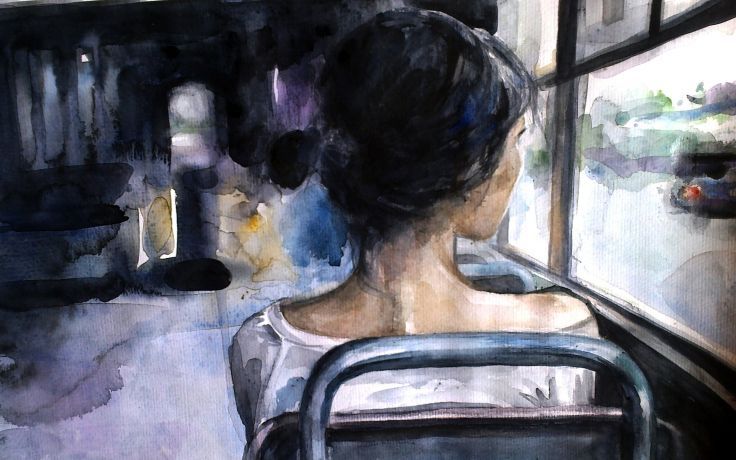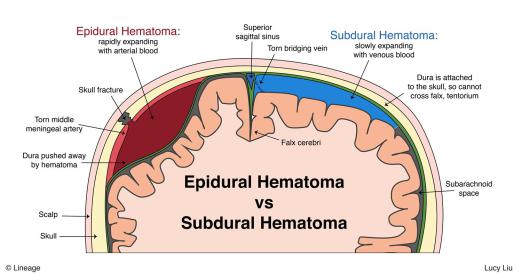This is another one of those things that occurred to me a while back, but it keeps cropping up whenever I think. I guess it fits with the purpose of this blog, so I figure I might as well discuss it here. There are times where I just get this nostalgic pang for the internet of my younger days – before social media, before the internet truly became mainstream, back when it used to truly feel like a “world wide web” and not just a small conglomerate of website behemoths standing front and center in front of any other foolish entities that try to make their own name on the internet. I understand the irony writing something like this from a platform like WordPress – and yet, somehow, I press on.
It reminds me of two distinct trips I’ve had – both to my father’s childhood neighborhood: Rome, New York. The first was when I was a child, clearly too young to appreciate the attempt my father made to share a part of himself with me. The second was when I had just wrapped up college. Both times, my father wanted to visit his older brother who still lived around their old home – admittedly the later visit was much more melancholy, as he would pass on the following year (my uncle was in poor health during our final visit). I wish I could remember more about the first visit. Alas, I was a child, so I can only remember really stupid things from my childhood – my standout memory from a family vacation to Hawaii was a giant Super Street Fighter II cabinet at a nearby arcade. The second visit stands out much more clearly in my memory – and it’s all the more melancholy for it. We arrived in Rome near sunset and being the kind of small town I’ve only heard about, the town was quiet. From my perspective, it seemed almost dead – like a graveyard. The visit to my uncle only set to cement my feelings of mourning. These were quite literally the ruins of my father’s early life – a life long before I had been born – and they were simultaneously unsettling and fascinating.
I’ve been reminiscing about that trip a lot more lately. Not specifically because of the content itself – more putting myself in my father’s shoes. The clear difference between Rome and where I grew up is that, nothing I remember from my childhood – none of the major locations – had anything resembling the kind of permanence. Most of them have been torn down and replaced with other things. Almost to the extent where I feel that trying to do with my own future children what my father did with me is well beyond my grasp. I think what may have spurred this on was the recent closing of my elementary school – which lasted a heart-breaking 99 years before the Archdiocese of Chicago decided to shut it down. The weirdest part about that was the fact that the school itself had been existing in a zombie-like coma for over a decade, so I thought it was literally unkillable. This led me to reflect on the places I remember best from my own childhood and how, out of the few that survived, are utterly unrecognizable. The building where I go to the gym used to be a place for kids’ birthday parties – I even had a few of my own there. The abandoned K-Mart we used to go to used to be a store that doesn’t even exist anymore – Venture, I believe. Hell, even the supermarket right by my house had to close down. Though another chain eventually replaced it, the company itself (Safeway, using the brand “Dominick’s”) left Chicagoland entirely, leaving several repurposed or empty storefronts in its wake.
Depressing thoughts all around, but somehow, they managed to become entangled with another – the internet is forever. I don’t know how that one managed to pop into my head, but when I was cataloging all of my dead childhood memories, it occurred to me just how wrong that is. I mean, I know what the intention was – it’s a warning to not put things online that you don’t want anyone else seeing. Ironically enough though, all this did was point out to me how fragile a lot of internet history was. Considering I’ve had an internet connection since I was 8 years old, I’ve seen a lot of things come and go. Sure, I’m not old enough to have been a part of the old Usenet days, but I was a pretty constant observer of what I believe is now referred to as “Web 1.0”.
The first website I can remember going to on a regular basis was a MegaMan fansite, run by someone who went by the pseudonym “PixelBoy”. The guy had a shitload of sprite sheets from all of the NES games. I remember I used to print them out like crazy – draining the ink cartridges in our family’s printer – and try to cut some of my favorite’s apart to craft my own simple scenes or just to decorate my school folders. If only I’d realized it would’ve been smarter to just download them as image files. By today’s standards, it was a fairly primitive site, but it left an imprint on me: this set my expectations for any website in the future.
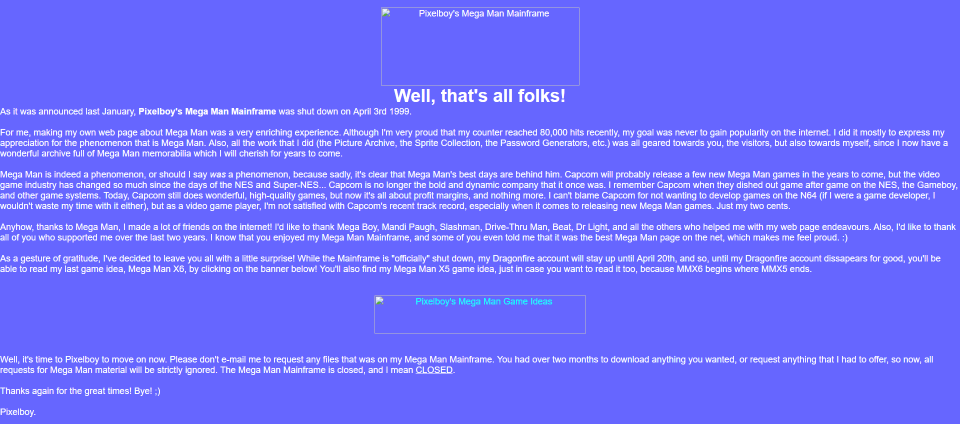 Ooof, now that’s just heartbreaking. (Taken from web.archive.org)
Ooof, now that’s just heartbreaking. (Taken from web.archive.org)
Of course, in spite of that, you also had some fairly simple websites – generally built on such platforms as GeoCities, Angelfire, Tripod and Xoom. The one that comes the most easily to mind is the “shrine”. Usually these sites would focus on a single character from a piece of media (usually anime or video games), though shrines for multiple characters weren’t exactly uncommon. Usually these sites would be filled with art galleries, usually consisting of both official artwork and fanart, though they would often include various other things: a character bio, a biography for the webmaster and usually links to other sites, either with similar themes or just to sites run by the webmaster’s friends. Though I understand why these little sites died out, they still fascinated me at the time.
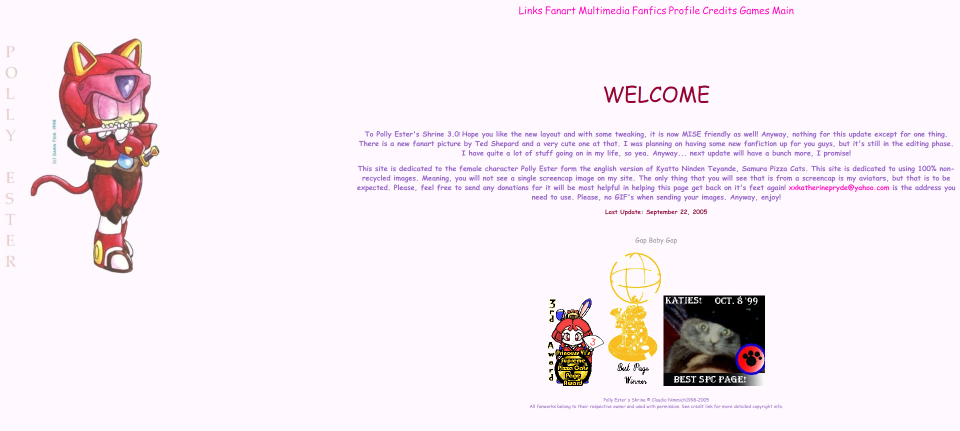 An example of a “web shrine”.
An example of a “web shrine”.
Probably the most interesting thing is just remembering the way websites used to be laid out back in the early days of the internet. I remember when having frames was a big deal, to the extent where many sites would offer versions both with and without frames. There was a time where people would create two different versions of their site: one with all the wacky audio files and animated GIFs they wanted and one without the frills for people with slower modems. Then there was the emergence of flash – that became the big thing for awhile. It’s kind of funny in retrospect, especially considering the big deal people made about wanting Flash to die after years of being fairly important when it came to things like web animation, online games and even website design.
Of course, a lot of people will bring up archive sites, like the Wayback Machine. However, in my experience, many of these archive sites leave a lot to be desired. For starters, you’ve got sites that blocked the type of bots they would use to create their archive. Then it’s not exactly uncommon that certain sites would be copied in an incomplete form: with broken links to various sub-pages and lacking key images and other media files – leaving it as nothing more that a blank slate. This can work for certain things, but when it comes to recreating the kinds of webpages I’m talking about, it falls a bit flat. It doesn’t help that for many websites, archive snapshots were taken on a strange schedule – I’ve seen cases where there have literally been years between cached copies of webpages.
Ironically, I think that a lot of what future generations could be taught about Web 1.0 and other previous iterations of the internet can still be found in physical media – specifically old books and videos about what was considered the contemporary internet at the time of their creation. I just have to wonder if there will be a time where internet history will be taught as a college course or even exist as some form of a discipline of study. It’s both an interesting concept on its own, but at the same time, it makes me feel ancient.
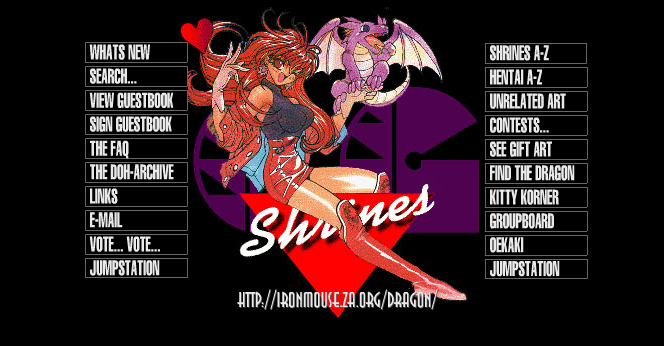 Hard to believe this place still exists — it’s pretty much exactly how I remember it, too.
Hard to believe this place still exists — it’s pretty much exactly how I remember it, too.
There was a time not so long ago when I considered explaining the concept of a “mall” to my children might have ended up being among the most difficult things to explain to my children. It seemed like malls were on their way out – emptying, becoming desolate, like ruins. This process has slowed significantly since I had these thoughts, regardless of malls no longer being the cultural center they were for teenagers from the 1980s all the way to my own 2000s. I always worried that they’d be torn down – demolished – to the extent where there wouldn’t even be ruins to show my children. I’m not nearly as worried about that these days, but the lack of permanence with regards to the internet is an interesting contrast. We live in an age where nostalgia is everywhere – especially my own generation – but at the same time, it feels like it’s an entirely mandated exercise. We only remember these specific memories – those deemed “important” by our cultural collective. And yet, I still have my own memories. I simultaneously curse and treasure what memories from my early years stand out – curse them because, as I mentioned before, my focuses were over the petty and smallest things imaginable; treasure them because there are those elements that don’t exactly sync up with what everyone else remembers: almost like a truer nostalgia, as what I’m remembering is otherwise mostly forgotten.
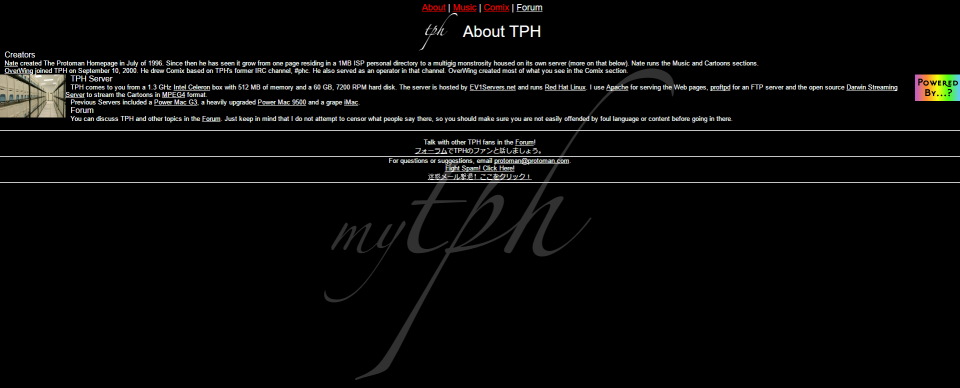 I don’t even remember why I’d bookmarked this site. I guess it was probably for the music?
I don’t even remember why I’d bookmarked this site. I guess it was probably for the music?
I guess my thoughts seem a lot more scattershot in this post, even compared to the other stuff on this personal blog. I guess the topic lends itself to it, considering this is more of a stream of consciousness than anything else I’ve written in a long time. Writing this stuff directly into WordPress’s WYSIWYG is kind of a trip: with my other blog, I’d always use a word processor. I guess I’m just rambling in general, because this is the flipside to nostalgia. We’ve become so used to positive sensations – the return of our childhood memories, generally repackaged to sell to both those who lived through the original and new audiences – that we forget the sense of loss that, at least at one point, was associated with the sensation. Nostalgia is a reminiscence of the past, but it’s also sadness because it will forever elude our grasp.
It’s kind of silly to hope that a company would try to recreate the kind of no-frills website creation suites that Angelfire and GeoCities offered in their heyday. Honestly though, it’s kind of bittersweet to revisit this: in spite of the fact that it is somewhat sad to recognize that the past is gone, my memories still persist. It’s the reason why there are times when I’ll just dig into my old bookmarks folder and see what gems I can dig up. Why I’ll occasionally jam out to MIDI files – whether they’re from my old archive or just random videos on YouTube – and somehow, they’ll feel a little more real than FLAC recordings. There are even times where I just have the urge to revisit YTMND – those old sites with GIFs set to audio were pretty impressive before YouTube made it big.
I remember reading something somewhere about a retirement community in some part of Europe, where they would take elderly people whose senility has regressed them to their childhood. They’d absolutely recreate the elements of their childhood. I’d have to say, the concept’s appealed to me ever since I heard of it. Granted, I feel like that level of mental deterioration is way too steep a price to pay for that kind of paradise. I just have to wonder if it would even be possible to recreate that sort of environment to a believable degree for people my age. Most of the old commercials we’d watch have decayed on VHS tapes, most of the flash-in-the-pan snack foods we’d eat have probably lost their recipes to time, the entire aesthetic of the 1980s and early 1990s seems to be impossible to recreate convincingly – if it’s done now, it’s usually with tongue planted firmly in cheek. Regardless, I think it’d be an interesting thing to see: we’ve got colonial towns, why not take some empty areas and recreate other eras from the past? I just wonder, considering all the random things that have emerged from history, not to mention all of the nostalgia-focused sites on the internet, if there is actually just a bunch of people who saved a bunch of old websites, to recreate what I loved about “Web 1.0”.
Advertisements Share this:
